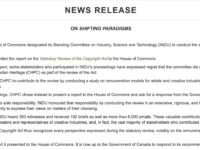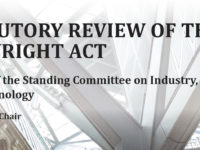The Industry committee’s clear assertion this week as the authoritative copyright review is grounded in process since the government gave it sole responsibility for conducting the review. While my earlier posts focus on the process and the unprecedented INDU release, the committee justifiably points out that it also heard from far more witnesses through hearings and briefs than the Heritage committee. In fact, it notes that it heard from the “vast majority of stakeholders who contributed to CHPC’s study.” Working with University of Ottawa student Philip Abraham, we reviewed the witness lists, the brief submissions, and the citations by the committees to better assess claims about which committee best reflects the full spectrum of stakeholder views on copyright. This post examines who participated in the committee work and a follow-up posts will highlight the balance in the witness lists and whether the committees were listening.
Latest Posts
“Sole Responsibility” for the Copyright Review: Industry Committee Issues Unprecedented News Release Confirming It Was Right To Ignore the Canadian Heritage Committee Study
My series on why the Industry committee rightly chose to ignore the Canadian Heritage committee study on artist remuneration took an unexpected turn yesterday. Hours after I posted an analysis demonstrating that the Heritage committee had ignored its mandate by tabling its report in the House of Commons, the Industry committee issued an unprecedented news release confirming that it did not consider the Heritage report and that its report is the exclusive copyright review. The news release states:
No Longer a “Proposed” Telecom Policy Direction: Government Resets Canadian Telecom Policy With Emphasis on Broader Approach to Competition
Earlier this year, Innovation, Science and Economic Development Minister Navdeep Bains sent shockwaves through the Canadian telecom industry by unveiling a proposed new policy direction to the CRTC based on competition, affordability, consumer interests, and innovation (my original post on the proposed direction here, podcast with Teksavvy’s Andy-Kaplan Myrth here). The big three telecom providers unsurprisingly objected to the government’s shift away from facilities-based competition toward a broader approach that welcomed all forms of competition. That shift signalled support for entry of new competitors such as mobile virtual network operators (MVNOs), a signal that the CRTC understood with its new-found support for them.
Process Failure: Why the Copyright Review Was Right To Ignore the Canadian Heritage Committee Study, Part One
The release of the much-anticipated copyright review report from the Standing Committee on Industry, Science and Technology has sparked a range of reactions. From UNEQ’s “the committee despises creators” to Canadian Music Publishers Association’s “disappointing“, some groups would clearly prefer that the government pay attention to the one-sided Canadian Heritage study instead. In fact, the report makes it clear that the committee did not read the Heritage study, as the committee thanked its colleagues and noted that it “looks forward to consulting their report.”
That approach angered Heritage committee member Pierre Nantel, who moved a motion that the committee “express its dismay” that its report was ignored. At this stage, it does not appear that the committee will consider Nantel’s motion as no further meetings are planned before the House of Commons breaks for the summer and then dissolves with the fall election.
The LawBytes Podcast, Episode 16: The Copyright Review Report – Carys Craig on the Roadmap for the Future of Canadian Copyright Law
In December 2017, the Canadian government launched its much-anticipated and much-lobbied review of Canadian copyright law, tasking the Standing Committee on Industry, Science and Technology to lead the way. After months of study and hundreds of witnesses and briefs, the committee released its authoritative report with 36 recommendations earlier this month. Carys Craig, a law professor at Osgoode Hall Law School and one of Canada’s leading copyright law experts, joins the podcast to help sort through the report and to consider what it means for the future of Canadian copyright law.











